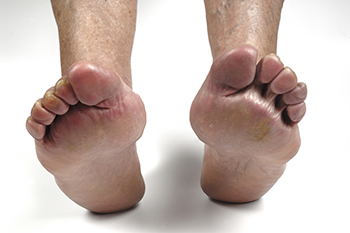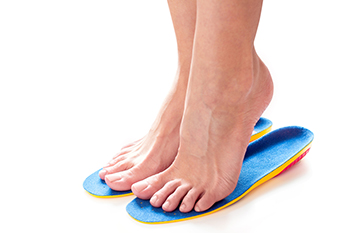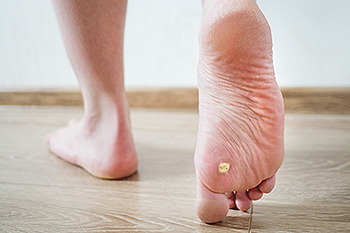Items filtered by date: September 2024
How Rheumatoid Arthritis Affects the Feet

Rheumatoid arthritis, or RA, is an inflammatory condition that commonly affects the joints, including those in the feet. People with RA often experience symptoms such as pain, swelling, and stiffness in the smaller joints of the toes and forefoot. Over time, if not properly managed, this can lead to joint deformities, nodules, and even altered foot shape. Foot issues from rheumatoid arthritis can affect mobility and quality of life, making it harder to perform daily activities. A podiatrist can help alleviate discomfort by prescribing custom orthotics, addressing inflammation, and offering treatments to slow joint damage. They can also address associated skin problems, like corns and calluses, which often develop from pressure points on the feet. Early intervention and continuous care are essential to prevent further complications. If you have foot pain related to rheumatoid arthritis, it is suggested that you make an appointment with a podiatrist for an exam, diagnosis, and treatment options.
Because RA affects more than just your joints, including the joints in your feet and ankles, it is important to seek early diagnosis from your podiatrist if you feel like the pain in your feet might be caused by RA. For more information, contact Judson Siegel, DPM of Assabet Family Podiatry. Our doctor will assist you with all of your podiatric concerns.
What Is Rheumatoid Arthritis?
Rheumatoid Arthritis (RA) is an autoimmune disorder in which the body’s own immune system attacks the membranes surrounding the joints. Inflammation of the lining and eventually the destruction of the joint’s cartilage and bone occur, causing severe pain and immobility.
Rheumatoid Arthritis of the Feet
Although RA usually attacks multiple bones and joints throughout the entire body, almost 90 percent of cases result in pain in the foot or ankle area.
Symptoms
- Swelling and pain in the feet
- Stiffness in the feet
- Pain on the ball or sole of feet
- Joint shift and deformation
Diagnosis
Quick diagnosis of RA in the feet is important so that the podiatrist can treat the area effectively. Your doctor will ask you about your medical history, occupation, and lifestyle to determine the origin of the condition. Rheumatoid Factor tests help to determine if someone is affected by the disease.
If you have any questions please feel free to contact our offices located in Plainville, Marlborough, and Somerset, MA . We offer the newest diagnostic and treatment technologies for all your foot and ankle needs.
It's Time for Beautiful Feet
Pain in the Top of the Foot

Pain in the top of the foot can arise from various causes, often linked to issues with tendons, ligaments, or bones. Common conditions include extensor tendinitis, where the tendons that lift the toes become inflamed, or stress fractures from overuse or repetitive strain. Other potential causes include nerve compression, such as from wearing tight footwear or a condition like Morton's neuroma, and arthritis affecting the foot joints. Bruises or injuries can also lead to localized pain on top of the foot. Proper diagnosis is imperative for effective treatment, which may involve rest or changes in footwear. If you are experiencing persistent or severe foot pain, it is suggested that you consult a podiatrist for a proper diagnosis and treatment.
Foot Pain
Foot pain can be extremely painful and debilitating. If you have a foot pain, consult with Judson Siegel, DPM from Assabet Family Podiatry. Our doctor will assess your condition and provide you with quality foot and ankle treatment.
Causes
Foot pain is a very broad condition that could be caused by one or more ailments. The most common include:
- Bunions
- Hammertoes
- Plantar Fasciitis
- Bone Spurs
- Corns
- Tarsal Tunnel Syndrome
- Ingrown Toenails
- Arthritis (such as Gout, Rheumatoid, and Osteoarthritis)
- Flat Feet
- Injury (from stress fractures, broken toe, foot, ankle, Achilles tendon ruptures, and sprains)
- And more
Diagnosis
To figure out the cause of foot pain, podiatrists utilize several different methods. This can range from simple visual inspections and sensation tests to X-rays and MRI scans. Prior medical history, family medical history, and any recent physical traumatic events will all be taken into consideration for a proper diagnosis.
Treatment
Treatment depends upon the cause of the foot pain. Whether it is resting, staying off the foot, or having surgery; podiatrists have a number of treatment options available for foot pain.
If you have any questions, please feel free to contact our offices located in Plainville, Marlborough, and Somerset, MA . We offer the newest diagnostic and treatment technologies for all your foot care needs.
Orthotics for Hammertoes

Orthotics are custom-made devices designed to support and align the foot, helping to relieve pain and discomfort associated with various foot conditions, including hammertoe. Hammertoe is a deformity where one or more toes bend abnormally at the middle joint, often causing pain and difficulty with footwear. Unlike splints, which are typically used to immobilize the toe to encourage straightening, orthotics are worn inside the shoe to redistribute pressure, cushion the foot, and improve alignment. Orthotics can alleviate the pain and discomfort associated with hammertoe by reducing friction and pressure on the affected toe, making walking and daily activities more comfortable. However, it is important to note that orthotics do not correct the deformity. They provide symptom relief and prevent the condition from worsening. Orthotics offer a non-invasive option to manage hammertoe symptoms effectively. For permanent correction, surgical intervention may be necessary. If you have a painful hammertoe, it is suggested that you schedule an appointment with a podiatrist to see if orthotics can help provide relief.
If you are having discomfort in your feet and would like to try orthotics, contact Judson Siegel, DPM from Assabet Family Podiatry. Our doctor can provide the care you need to keep you pain-free and on your feet.
What Are Orthotics?
Orthotics are inserts you can place into your shoes to help with a variety of foot problems such as flat feet or foot pain. Orthotics provide relief and comfort for minor foot and heel pain but can’t correct serious biomechanical problems in your feet.
Over-the-Counter Inserts
Orthotics come in a wide variety of over-the-counter inserts that are used to treat foot pain, heel pain, and minor problems. For example, arch supports can be inserted into your shoes to help correct overarched or flat feet, while gel insoles are often used because they provide comfort and relief from foot and heel pain by alleviating pressure.
Prescription Orthotics
If over-the-counter inserts don’t work for you or if you have a more severe foot concern, it is possible to have your podiatrist prescribe custom orthotics. These high-quality inserts are designed to treat problems such as abnormal motion, plantar fasciitis, and severe forms of heel pain. They can even be used to help patients suffering from diabetes by treating foot ulcers and painful calluses and are usually molded to your feet individually, which allows them to provide full support and comfort.
If you are experiencing minor to severe foot or heel pain, it’s recommended to speak with your podiatrist about the possibilities of using orthotics. A podiatrist can determine which type of orthotic is right for you and allow you to take the first steps towards being pain-free.
If you have any questions please contact our offices located in Plainville, Marlborough, and Somerset, MA . We offer the newest diagnostic and treatment technologies for all your foot and ankle needs.
Plantar Warts and Effective Relief Methods

Plantar warts are benign growths that appear on the soles of the feet due to an infection from the human papillomavirus, or HPV. They can cause discomfort and pain, making walking or standing difficult. These warts have a rough texture and can sometimes contain tiny black dots, which are small blood vessels. Various relief methods are available for those suffering from plantar warts. Mild treatments often include salicylic acid, which helps to peel away the wart gradually. Cryotherapy, which involves freezing the wart with liquid nitrogen, is another common approach. For persistent or severe cases, a podiatrist may recommend procedures like laser therapy or minor surgical removal. Plantar warts, which are both highly contagious and stubborn, can cause extreme pain and discomfort. If you have developed this type of wart, it is suggested that you consult a podiatrist who can offer you effective relief and treatment methods.
Plantar warts can be very uncomfortable. If you need your feet checked, contact Judson Siegel, DPM from Assabet Family Podiatry. Our doctor will assist you with all of your foot and ankle needs.
About Plantar Warts
Plantar warts are the result of HPV, or human papillomavirus, getting into open wounds on the feet. They are mostly found on the heels or balls of the feet.
While plantar warts are generally harmless, those experiencing excessive pain or those suffering from diabetes or a compromised immune system require immediate medical care. Plantar warts are easily diagnosed, usually through scraping off a bit of rough skin or by getting a biopsy.
Symptoms
- Lesions on the bottom of your feet, usually rough and grainy
- Hard or thick callused spots
- Wart seeds, which are small clotted blood vessels that look like little black spots
- Pain, discomfort, or tenderness of your feet when walking or standing
Treatment
- Freezing
- Electric tool removal
- Laser Treatment
- Topical Creams (prescription only)
- Over-the-counter medications
To help prevent developing plantar warts, avoid walking barefoot over abrasive surfaces that can cause cuts or wounds for HPV to get into. Avoiding direct contact with other warts, as well as not picking or rubbing existing warts, can help prevent the further spread of plantar warts. However, if you think you have developed plantar warts, speak to your podiatrist. He or she can diagnose the warts on your feet and recommend the appropriate treatment options.
If you have any questions please feel free to contact our offices located in Plainville, Marlborough, and Somerset, MA . We offer the newest diagnostic and treatment technologies for all your foot and ankle needs.

